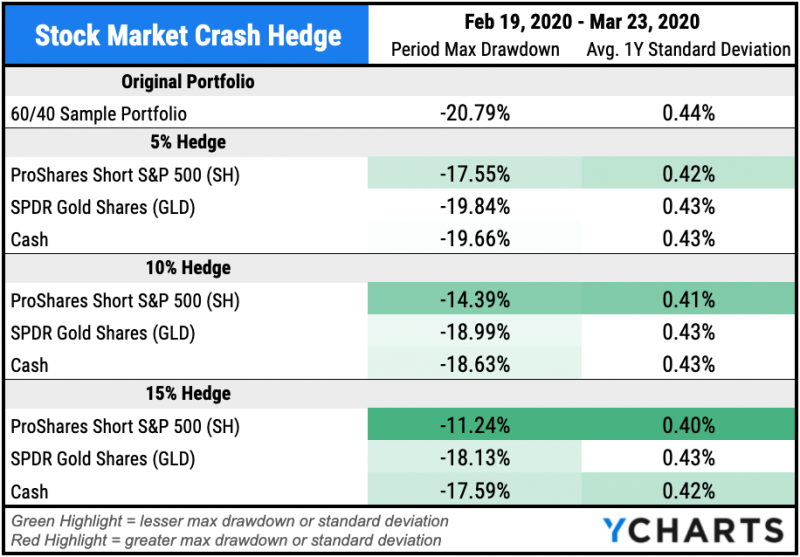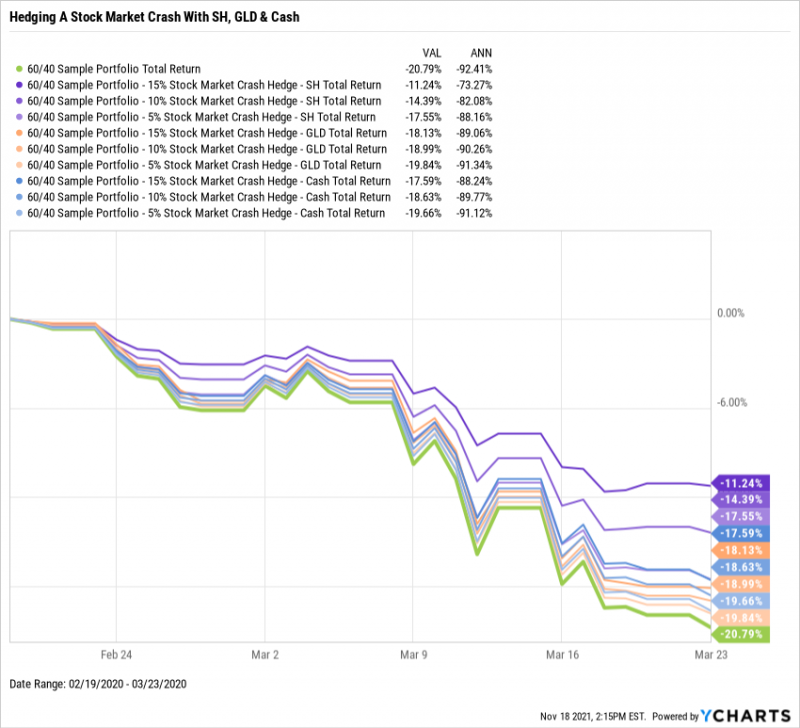Can You Hedge a Stock Market Crash with an ETF?
The biggest stock market crashes of the 21st century are still etched into investors’ brains—the early 2000s Dot-Com bubble, the 2008 Financial Crisis, and the 2020 Coronavirus pandemic each rattled markets and our daily lives in unique ways. It seems that at any given moment, there are a number of reasons to expect a pull-back in stocks.
But what’s the best way to hedge a market crash when you are anticipating one? Conventional wisdom points to Cash and Gold, but short market ETFs have made “fading the market” strategies easier than ever. Can these assets actually protect your portfolio, or even provide a lift during periods of volatility? And, for ease of implementation, will an exchange-traded fund (ETF) do the trick for hedging the average portfolio against future stock market crashes?
To better answer these questions, we examined how different hedging strategies performed during previous stock market crashes. Our findings shed light on the potential benefits and drawbacks of hedging with ETFs when added to a hypothetical, balanced portfolio of 60% equity, 40% fixed income.
Download the new White Paper—which also looks into hedging inflation, volatility, geopolitical risk, and climate change using ETFs—for our full findings:
The Best Stock Market Crash Hedges in 2020
Our Can You Hedge It with an ETF? white paper reviews three of the most significant market crashes in recent memory to measure the efficacy of hedging with different ETFs. Here, we focus on the most recent period in 2020.
From February to March 2020, the fastest, most dramatic stock market crash on record cut the S&P 500’s value by 33.8% in just over a month’s time. Our analysis showed the perfectly inverse ProShares Short S&P 500 ETF (SH) hedge provided the best downside protection and limited drawdowns significantly. The SPDR Gold Shares ETF (GLD) improved portfolio risk by relatively little, losing its traditional safe-haven status in this instance, as COVID-19 ravaged nearly every asset class.
Download Visual | See the Full White Paper
When the COVID-19 pandemic hobbled both investor sentiment and the world, nearly every asset class plunged and effective hedges were relatively hard to come by. As such, hedging with the ProShares Short S&P 500 ETF (SH) performed best due to its direct inverse relationship with the index. Of course, timing both the market crash and a hedge using SH would have been extremely difficult.
From 5% to 15%, hedging a market crash with Cash, while more effective than SPDR Gold Shares ETF (GLD) overall, resulted in only marginally better risk management.
Download Visual | See the Full White Paper
To see whether ETF hedges were effective during the other noteworthy stock market crashes, as well as for other risk factors such as inflation, volatility, geopolitical risk, a weakening US Dollar, or climate change, download the FREE white paper today!
Connect With YCharts
To get in touch, contact YCharts via email at hello@ycharts.com or by phone at (866) 965-7552
Interested in adding YCharts to your technology stack? Sign up for a 7-Day Free Trial.
Disclaimer
©2022 YCharts, Inc. All Rights Reserved. YCharts, Inc. (“YCharts”) is not registered with the U.S. Securities and Exchange Commission (or with the securities regulatory authority or body of any state or any other jurisdiction) as an investment adviser, broker-dealer or in any other capacity, and does not purport to provide investment advice or make investment recommendations. This report has been generated through application of the analytical tools and data provided through ycharts.com and is intended solely to assist you or your investment or other adviser(s) in conducting investment research. You should not construe this report as an offer to buy or sell, as a solicitation of an offer to buy or sell, or as a recommendation to buy, sell, hold or trade, any security or other financial instrument. For further information regarding your use of this report, please go to: ycharts.com/about/disclosure
Next Article
PayPal's PE, Gas Prices, the Ruble's Crash - What’s Trending on YCharts?Read More →


